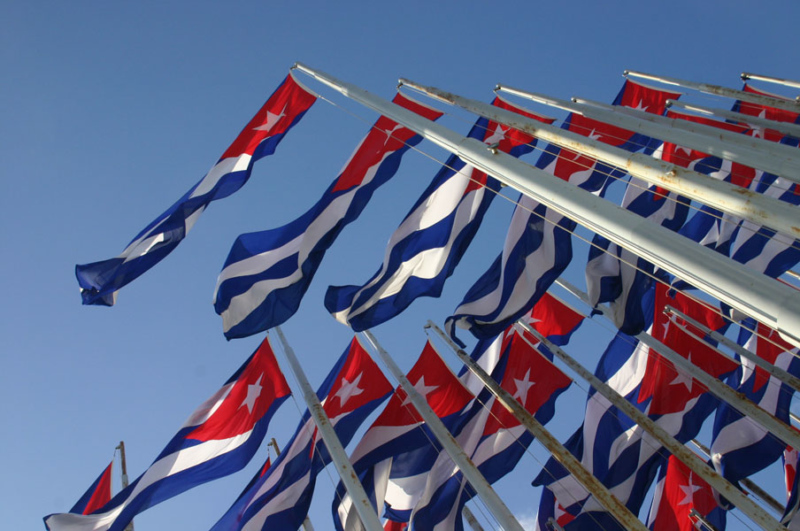Europe Might Take Another Step Back
If Spain fails to have the Common Position lifted or if it succeeds and Havana again turns down European economic cooperation, then Cuba wins once more.
President Donald Trump’s decision last month to increase sanctions on Cuba represents a strategic error with serious long-term repercussions for U.S. national security.
Efforts to tighten the screws at this tenuous moment will not only alienate U.S. partners in the Western Hemisphere and Europe, harm U.S. businesses, and strangle Cuba’s emerging private sector, but also undermine U.S. interests in the very area the Trump administration claims to prioritize: great power competition. By exacerbating the economic downturn in Cuba, Trump and his ideologically driven national security advisors are pushing Cuba into the arms of China and Russia. At the same time, Trump’s Cuba policy increases the risk of a humanitarian crisis by creating conditions for mass migration from an island just 90 miles from the Florida shores.
On April 17, the administration announced that it would tighten the failed embargo, further limit travel to the island, and cap remittances, a set of policies that will squeeze the already weak Cuban economy, which is in dire straits due largely to mismanagement and dependence on Venezuelan oil. Even before Venezuela’s recent descent in chaos, oil deliveries had fallen by over 40 percent, and Cuban annual growth averaged a dismal 1 percent for the past three years. Trump’s changes, which will allow Americans to sue any company that has benefited from expropriated property on the island, will unleash an avalanche of lawsuits against foreign and U.S. businesses, serving as a huge deterrent to foreign investment in industries from tourism to energy. This super-embargo won’t hasten a democratic transition in Cuba. Instead, it will help both China and Russia achieve their stated policy goals of expanding their influence in the Americas.
“The central challenge to U.S. prosperity and security is the reemergence of long-term, strategic competition,” primarily from China and Russia, Trump’s 2018 National Defense Strategy states. However, the Trump team has yet to devise a coherent policy response to Chinese infrastructure projects and corrosive capital in the Americas, and this is certainly the case when it comes to Cuba, a small state that is especially vulnerable to Chinese economic overtures. If Nicolás Maduro’s Venezuela, Cristina Fernández de Kirchner’s Argentina, and Rafael Correa’s Ecuador serve as lessons, China is more than willing to step in as the lender of last resort. Indeed, China is currently Cuba’s largest international creditor and trading partner, and Cuban President Miguel Díaz-Canel signed on to the Belt and Road Initiative in November 2018.
China is not the only U.S. rival involved with Cuba. Its geographic proximity to the United States appeals to Russian President Vladimir Putin. Russia began ramping up its activities in the Americas in the mid-aughts through high-level visits along with economic and defense agreements. In the case of Cuba, the Russian oil company Rosneft stepped in to help address the drop in Venezuelan oil by increasing its exports to the island. There is also an element of military power projection, as demonstrated by Moscow’s $43 million loan for Havana to develop its defense sector and purchase Russian military equipment.
A sharp economic downturn in Cuba after the fall of the Soviet Union led to the 1994 balsero exodus, when the U.S. Navy and Coast Guard were tasked with intercepting over 30,000 refugees who fled the island in makeshift rafts. As after the termination of Soviet subsidies, food shortages are now likely to increase as Venezuelan largesse dries up. Americans should brace themselves for Trump to demand a sea wall to complement his U.S.-Mexico border wall. Moreover, since former President Barack Obama ended policies that gave Cubans arriving by boat a path to residency in the United States, migrants from the island are increasingly joining Guatemalans, Hondurans, and Salvadorans on the perilous journey through Mexico to the U.S. border.
Meanwhile, Trump has sidelined seasoned Latin America experts in the State Department in favor of ideological voices on the National Security Council and in Congress who argue that a 60-year-old embargo will work if only Washington tightens it and hangs on to it a bit longer. As deputy assistant secretary of defense for Western Hemisphere affairs under Obama, I witnessed firsthand the benefits of his policy of engagement with Cuba for U.S. security, including cooperation in areas such as counternarcotics, migration, cybersecurity, and military medicine. Just months after Obama announced a new opening to Cuba in December 2014, U.S. Navy doctors worked alongside Cuban doctors to provide medical care in Haiti, and the two countries had their first law enforcement dialogue in 2015, which became a forum for exchanging actionable information on transnational criminal organizations that operate in both the United States and in Cuba. By reversing the rapprochement, the Trump administration has ceded these kinds of relationships to China and Russia.
If the U.S. goal is a democratic transition in Cuba, it should not deliberately create the conditions for the country to fall under the sway of the United States’ two most powerful strategic competitors—authoritarian countries that have demonstrated their desire to undermine liberal democracy across the globe.
If Spain fails to have the Common Position lifted or if it succeeds and Havana again turns down European economic cooperation, then Cuba wins once more.
After a 7.0 magnitude earthquake struck Haiti, the aftershock reached China in ways that few anticipated.The earthquake forced Chinese leaders to navigate the tricky politics of disaster relief.
The Summit of the Americas was marked by discord between the US and Latin American countries. What did it accomplish, if anything?
 Flickr / CC BY-NC-ND 2.0
Flickr / CC BY-NC-ND 2.0